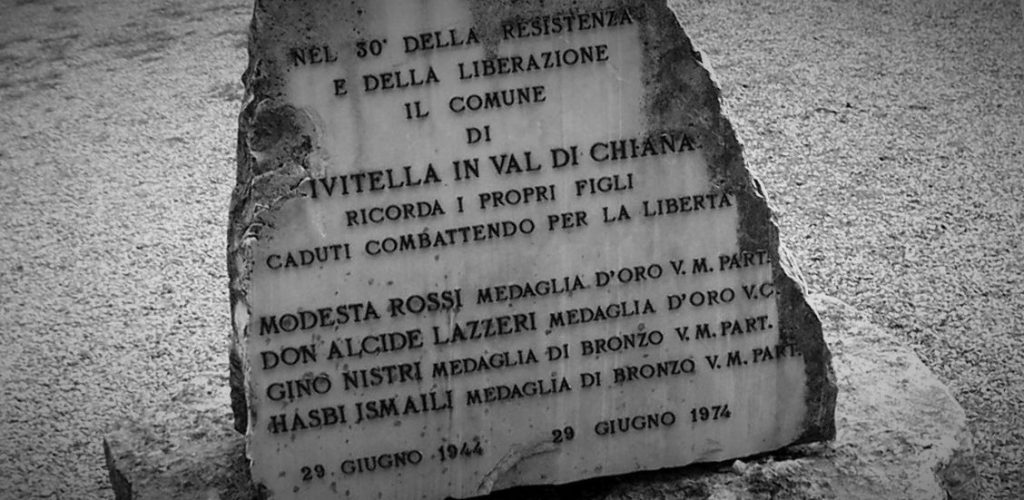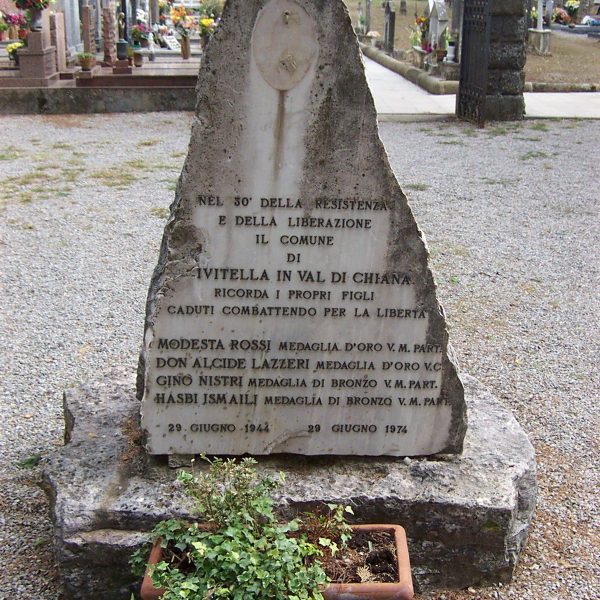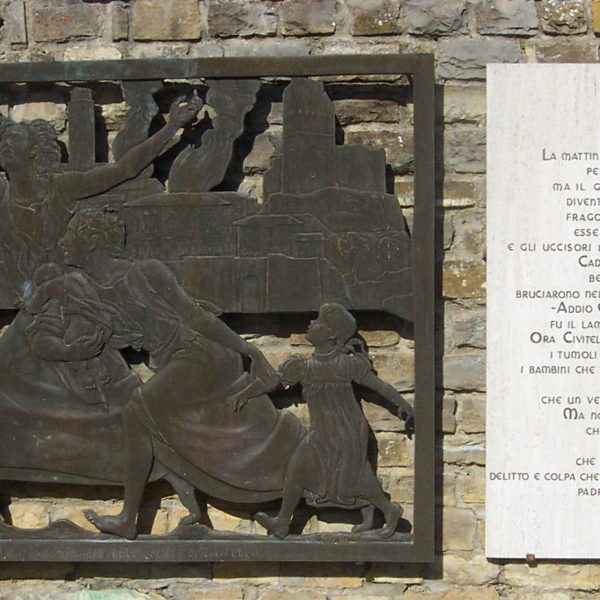
The History
The events of 29 June ’44 – Civitella
The breadth of the operation and the number of units involved in the events of Civitella does not allow to establish exactly the time, but all the surviving witnesses agree in identifying the arrival of the German soldiers at around 5.30 am, when the families were preparing to go to Mass on the day of St. Peter and Paul. Among the aims of the operation there was certainly also the intent to slow the advancing of the Allied army, while the Germans were building in the Apennines the Gothic Line in defense of northernItaly.
The first to be killed were the inhabitants of the hamlets around Civitella. The houses of Palazzina, Querciola, Maestà Tonda were raided by the German soldiers and in each place were killed the men, women and children who had remained at home. The German soldiers entered Civitella from Porta Senese, walking the streets of the village and pushing towards the church those who were captured along their way. The German soldiers then arrived at the old age home and killed eight guests who were inside.
In front of the church, where the inhabitants had gathered, they found the door locked. The parish priest, Don Alcide Lazzeri, probably realizing what was happening, had blessed the people and closed them inside the building. The soldiers threw a hand grenade to open the door and dragged out the people who were locked up hoping to save themselves. It seems then that don Alcide had shouted: “I’m responsible for what happened, kill me.” The attempt was futile. The men were taken to the church in groups of five, and killed. The same Don Lazzeri died in the slaughter. After the executions, the German soldiers continued to kill the remaining inhabitants into their homes. Finally, they set fire to the houses of Civitella, killing even those who had tried to escape by hiding in cellars or attics. Only a few men managed to escape the massacre.
The background
On the evening of June 18th, 1944, Sunday, nine German soldiers, perhaps paratroopers of “Hermann Göring” division, approached a farmhouse at the Madonna, near Civitella. After having dinner, they headed for the recreational club of the village and sat at a table, with their weapons on the ground. A group of partisans, learning that some German soldiers had entered the village, decided to disarm them. At about 9.00 pm, they entered the club. Here the versions diverge: some say that the partisans immediately opened fire, others instead favour an intimation of surrender, whereupon the Germans would react. In any case, there was a firefight and three Germans fell to the ground. One of them, unharmed, was able to escape. In the recreational club the confusion was at its highest, the civilians were fleeing from everywhere and someone had also been wounded. Two German soldiers were dead and one woundedAt about 11.00 pm, a German soldier arrived to the farmhouse of the Madonna. He was carrying on his shoulders a comrade, the soldier wounded at the recreational club, who was washed and treated until his companions took him away on a truck. In the village, meanwhile, when the day broke, the population fled in terror fearing a retaliation. Meanwhile, the archpriest Don Alcide Lazzeri, learned of the incident and decided to wash the two dead Germans and organize their funeral with the few women he managed to find.
But the Germans still didn’t react. On June 20th, a German officer arrived, perhaps a doctor, to examine the two bodies that were still lying in the club. With the aid of an interpreter, he listened to Don Lazzeri, who recalled the stages of the attack and said that the civilians weren’t guilty of what had happened. The officer accepted, as a sign of good will, that the two soldiers would be buried in the local cemetery, and so happened, with the participation of a picket of German soldiers. But still the intentions of the soldiers were not clear, and the villagers were afraid to return. After a series of investigations, the Germans went away. Indeed, some said to the inhabitants of Civitella to be calm, because there would be no reprisals. But instead, on the morning of June 29th, 1944, when for the feast of St. Peter and Paul many people had returned home, units of paratroopers of the armored division “Hermann Göring”, flanked by other soldiers, some of them Italians, surrounded the village at dawn. All men were captured in their homes and taken to the town square, among them don Lazzeri, who offered his life in exchange for that of the civilians. He wasn’t listened to: he was killed with a gunshot to the head as all the other 149 victims, including two priests. Then, the bodies were thrown into the houses of the village to which the Germans set fire.
The breadth of the operation and the number of units involved in the events of Civitella does not allow to establish exactly the time, but all the surviving witnesses agree in identifying the arrival of the German soldiers at around 5.30 am, when the families were preparing to go to Mass on the day of St. Peter and Paul. Among the aims of the operation there was certainly also the intent to slow the advancing of the Allied army, while the Germans were building in the Apennines the Gothic Line in defense of northern Italy.
The first to be killed were the inhabitants of the hamlets around Civitella. The houses of Palazzina, Querciola, Maestà Tonda were raided by the German soldiers and in each place were killed the men, women and children who had remained at home. The German soldiers entered Civitella from Porta Senese, walking the streets of the village and pushing towards the church those who were captured along their way. The German soldiers then arrived at the old age home and killed eight guests who were inside.
In front of the church, where the inhabitants had gathered, they found the door locked. The parish priest, Don Alcide Lazzeri, probably realizing what was happening, had blessed the people and closed them inside the building. The soldiers threw a hand grenade to open the door and dragged out the people who were locked up hoping to save themselves. It seems then that don Alcide had shouted: “I’m responsible for what happened, kill me.” The attempt was futile. The men were taken to the church in groups of five, and killed. The same Don Lazzeri died in the slaughter. After the executions, the German soldiers continued to kill the remaining inhabitants into their homes. Finally, they set fire to the houses of Civitella, killing even those who had tried to escape by hiding in cellars or attics. Only a few men managed to escape the massacre.
The Victims
Don Alcide Lazzeri, 57 years old
Agrippi Giorgio, 60 years old
Bacconi Angelo, 45 years old
Balucani Italo, 52 years old
Bartolucci Armando, 58 years old
Bernardoni Zelindo, 61 years old
Bernini Basilio, ? years old
Bonichi Azelio 36 years old
Bonichi Eliseo, 52 years old
Bozzi Conforto, 48 years old
Bozzi Pietro, 18 years old
Bozzi Fernando, 21 years old
Bozzi Bernardo, 28 years old
Caccialupi Federigo, 80 years old
Caccialupi Giuseppe, 34 years old
Caldelli Adolfo, 44 years old
Caldelli Virgilio, 53 years old
Caldelli Ibo, 39 years old
Cardini Antonio, 75 years old
Cetoloni Egidio, 39 years old
Cetoloni G. Battista, 63 years old
Coradeschi Rosa, 61 years old
Crespignani Crespino, 80 years old
Falsetti Francesco, 77 years old
Falsetti Giovanni, 46 years old
Falsetti Luigi, 70 years old
Falsetti Settimio, 49 years old
Fabianelli Carlo Ottavio, 68 years old
Fracassi don Sebastiano, 74 years old
Forni Fedele, 63 years old
Franci Caterina, 8 years old
Franci Giuseppe, 47 years old
Giovanetti Egisto, 68 years old
Giuliani Lorenzo, 62 years old
Gualdani Cesare, 42 years old
Gualdani Luigi, 75 years old
Guerrini Luigi, 70 years old
Iacomoni, 63 years old
Lammioni Maria, 2 years old
Lammioni Giuliana, 5 years old
Lammioni Alessandro, 57 years old
Lammioni Dante, 50 years old
Lammioni G. Battista, 48 years old
Lisi Gregorio, 68 years old
Magini Rinaldo, 53 years old
Marchetti Gino, 36 years old
Marsili Azelio, 40 years old
Marsili Giustino, 48 years old
Menchetti Torquato, 27 years old
Milani Francesco, 67 years old
Morfini Carlo, 79 years old
Mucciarini Alfredo, 67 years old
Nardi Elena, 70 years old
Nocentini Arturo, 30 years old
Paggi Gastone, 37 years old
Pasqui Alfredo, 49 years old
Pasqui Giuseppe, 18 years old
Pasqui Settimio, 57 years old
Poltri Angiola, 82 years old
Poltri Luigi, 76 years old
Polvani Giuseppe, 74 years old
Rossi Andrea, 72 years old
Sabatini Paolo, 54 years old
Sandrelli Maria, 34 years old
Mandrini Penelope, 77 years old
Salvatori Assunta, 43 years old
Scaletti Dario, 77 years old
Sensini Francesco, 80 years old
Tavarnesi Agostino, 66 years old
Tiezzi Angiolo, 67 years old
Tiezzi Bruno, 21 years old
Tiezzi Leonello, 58 years old
Tiezzi Pilade, 54 years old
Tozzi Silvio, 39 years old
Trippi Quinto, 30 years old
Vannucchi Silvio, 54 years old
Venturini Alfredo, 52 years old
Verdelli Emilio, 62 years old
Zelli Antonio, 20 years old
Zelli Nello, 16 years old


